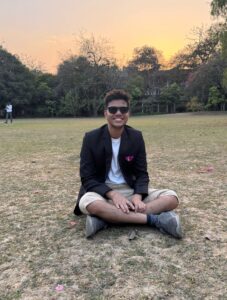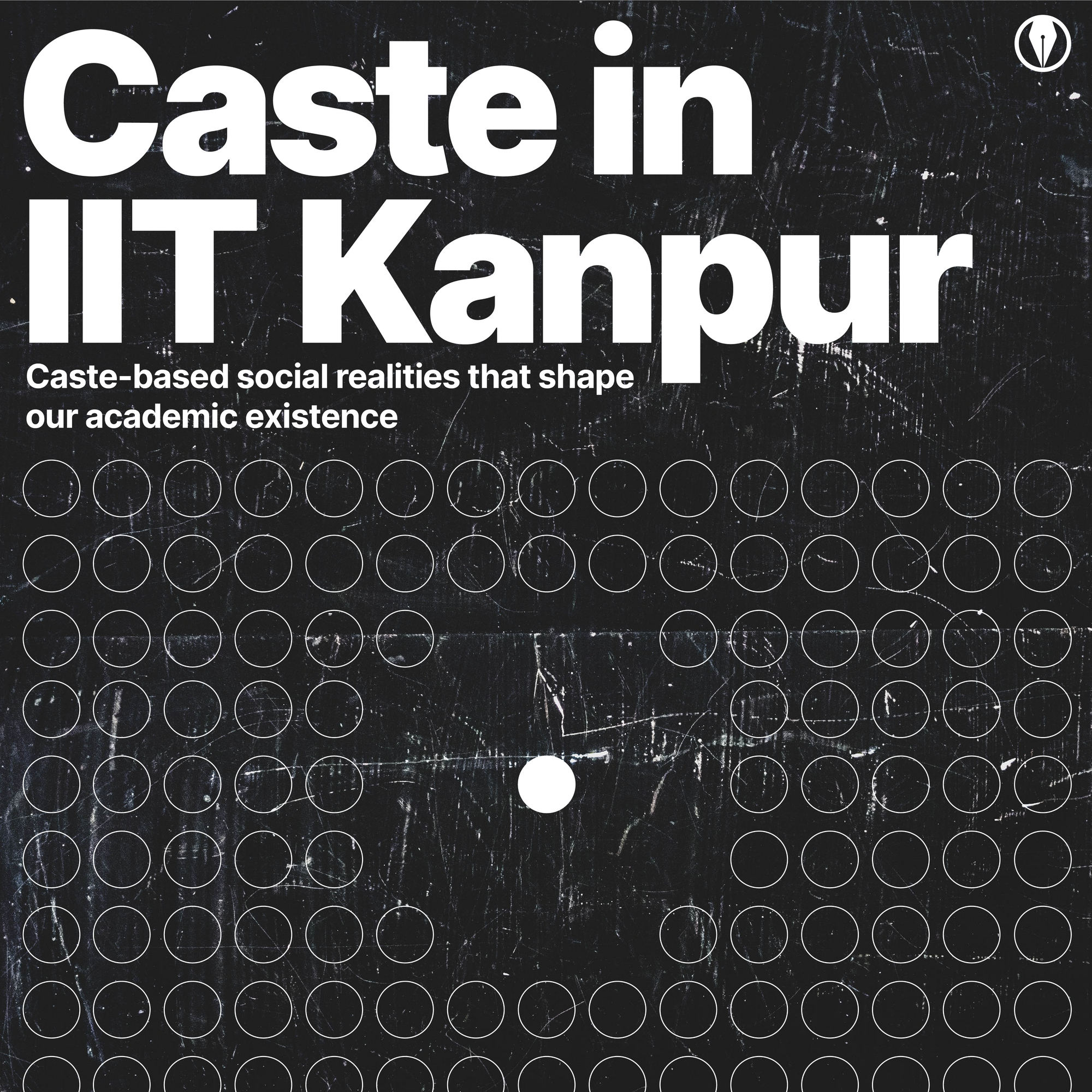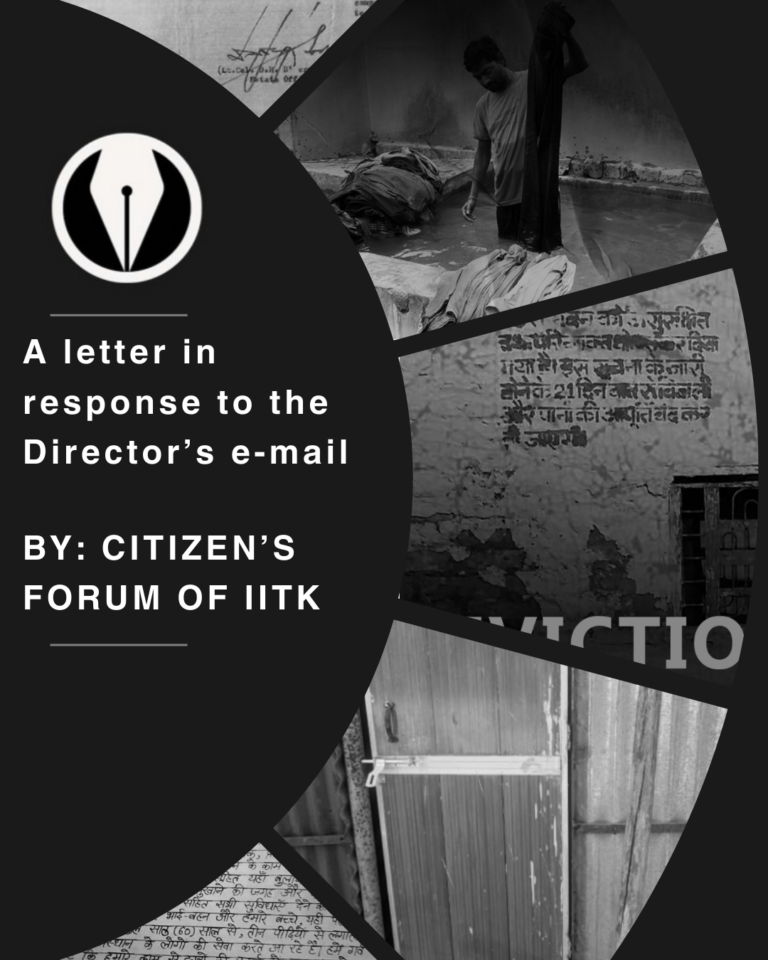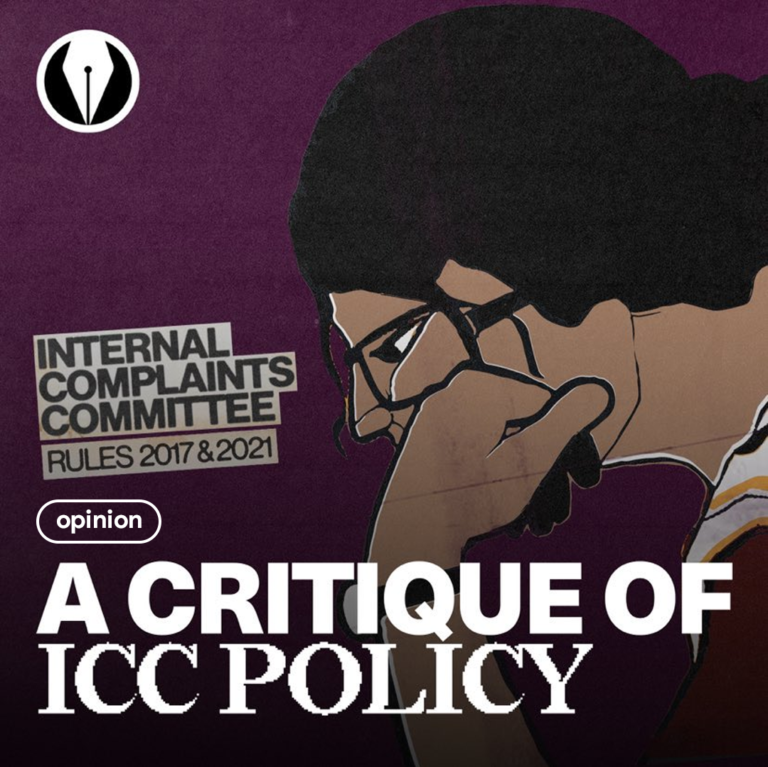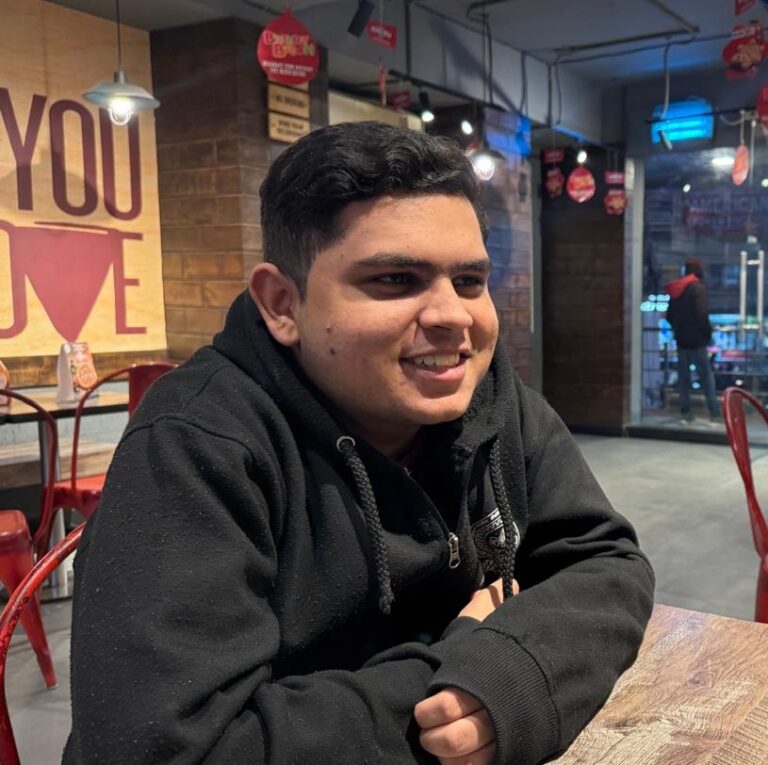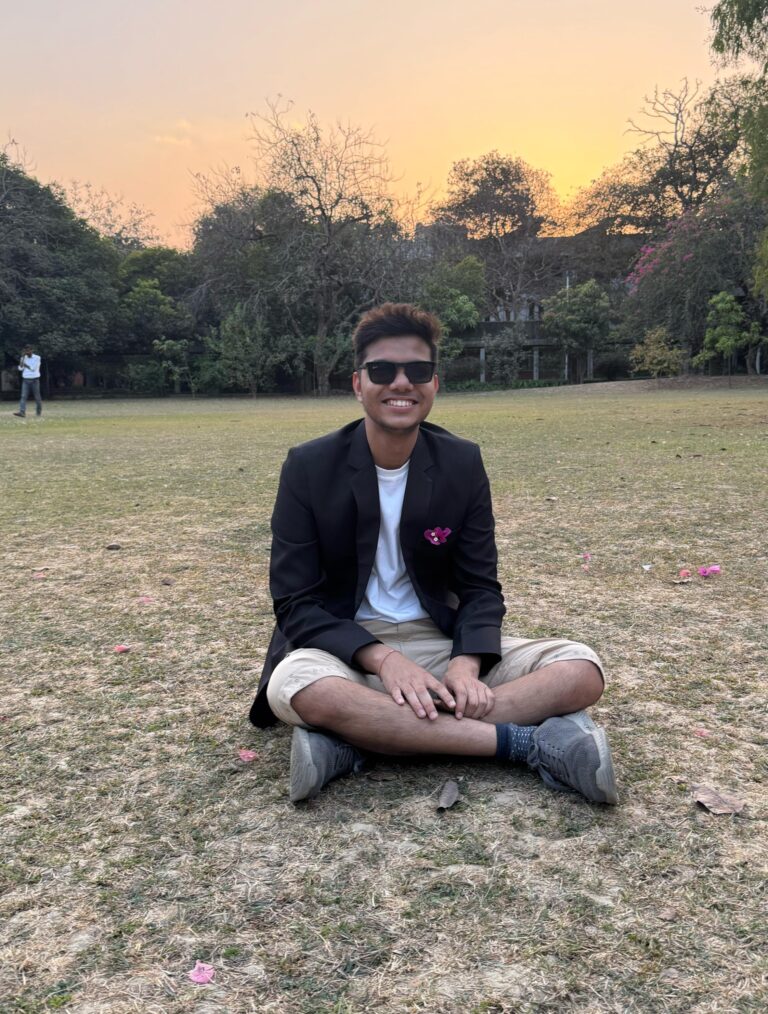Disclaimer: The opinions expressed below are the opinions of the writers and theirs alone.
“The value of a man was reduced to his immediate identity and nearest possibility. To a vote. To a number. To a thing.” – Rohith Vemula
In October 2021, an Assistant Professor at IIT Madras resigned, stating caste-based discrimination at the hands of his colleagues as the reason behind his resignation. Just a few weeks later, a PhD scholar at Mahatma Gandhi University, Kerala sat on a hunger strike, similarly alleging caste-based harassment and discrimination by the director of the International and Inter-University Centre for Nanoscience and Nanotechnology (IIUCNN) at MGU. The news cycle of the past year itself paints a certain picture of the complex and insidious ways in which caste comes to function in academic spaces. Closer home at IIT Kanpur (IITK hereafter) there was an incident recently, where a group of students received casteist abuses over an online portal. The incident came to our knowledge only because one person chose to speak about it in a close circle. Talking about our own experiences with each other revealed to us a serious lack of institutional and/or informal support systems for students in such situations within the campus.
Academia is often looked at as an island that is cut off from the existing social realities of common life. This facade functions as an excuse to not allow any conversation about the inequalities we experience in our daily life. Discourses about caste are appropriated by anti-reservationists in Indian academic spaces. It is no different in IIT Kanpur. The city outside is divided along caste and class lines, while the campus itself puts up an appearance of being an egalitarian community (that is, modern caste-lessness). There is an assumption here that your caste identity becomes irrelevant as soon as you step inside the campus. But the scarce numbers of reservation faculty hires and the sheer number of upper caste surnames in the various departmental faculty lists tell a different story altogether1. The numbers of Dalit2 undergraduate students who were terminated as a result of their purported subpar academic performance are also considerable and worrying.
Caste shapes our social, cultural, and economic experiences. An individual’s caste location determines their accessibility to various resources. Caste in this way is not just a socio-cultural phenomenon but is a hierarchical system that determines our access to resources. Its existence in the realm of dominant ideas determines its perpetuation in the day to day material existence and vice versa. Yet, within academic campuses (especially IITs, IIMs, IISERs) there is hardly any discussion on caste realities and there are hardly any caste-based support groups. For example, IIT Kanpur has the presence of a gender sensitization Women’s Cell but with regards to caste, there is absolute silence. Through this article, we would like to investigate the caste-ridden realities which exist for students of IIT Kanpur. The purpose is to provide a holistic account, which leads to future conversations amongst the student community in IITK and beyond3.
In order to disturb the silence around caste that showcases itself in an apparent caste-lessness in the academic culture of IIT Kanpur, we felt the need to build a conversation and learn about the students’ experiences of caste. We talked to both so-called upper caste4 as well as Dalit students. From these conversations, it was made clear to us that we interact with the notion of caste at various stages and facets of life. Through the interviews, we have tried to understand various lived experiences of the students of IIT Kanpur before and during their campus life. These students come from diverse economic, social and cultural backgrounds. Some of the salient pointers that came out are notions of purity and pollution and deep-seated insecurities around caste identities. Common living facilities meant people are expected to socialise, this process has only meant the propagation of caste practices in dining facilities, rooms, and common areas.
We started our conversations by talking about our colleagues’ first memories of caste. One of our fellow Dalit students recollected an incident from his childhood which made him aware of his caste position for the very first time. He had gone to fetch water from a common facility in his ancestral village. “Not only was I denied access to the facility, but my pot was also kicked by one person belonging to an upper caste,” he said. Another upper caste student mentions touching a Dalit teacher’s feet on the occasion of Teachers’ Day. “This gesture was frowned upon by the other upper caste staff of the school. My father was asked by the principal to forbid him from repeating such gestures in the future,” the respondent recalled. One upper-caste respondent recalled how she was rebuked by her mother for taking a kid in her lap in her native village. The kid in question apparently belonged to a so-called lower caste5. All of these incidents take place in the early teen years of these respondents, a stage of socialisation in life when they are building individual and social consciousness.
Another Dalit scholar shared that ever since his childhood, he had started to face a sudden decrease in his scores as soon as his caste was revealed. He did a social experiment in which he decided to exchange his drawing with a friend and discovered that the teacher graded his drawing on the basis of his surname, rather than on the basis of his skill. From their experiences of either being discriminated against for their caste position, or for being made aware of their caste position vis-a-vis being a Dalit or being upper caste (also known as graded inequality), we learned that the students who come to IIT Kanpur come here with the baggage of their caste location. They are already conditioned into casteism, the same casteism which they either perpetuate and/or continue to suffer through in its various iterations.
We collected examples of a system that discourages Dalit students from creating spaces to organise. The attempt is to kill off the radical potential of these individuals who are capable of thought, feeling and questioning. The distinction among students coming from various backgrounds is evident, in their academic as well as hostel life. One Dalit respondent mentioned that their father advised them to be careful about not revealing their caste identity once they come to a campus like IIT. The person did not pay much attention as they thought that these are things of the past and their father is being unnecessarily protective. However, to their surprise, when they came to the campus, they realised that casteism is very prevalent even today, in practices such as asking the new students about their credentials so as to learn whether they belong to a reserved category or not. Another respondent shared an anecdote about his experience in an IIT Kanpur mess. One so-called upper caste student used to avoid sitting with our respondent at the same table, as our respondent used to eat meat. Some may pass this as ‘aversion to meat’, but this aversion itself stems from a hierarchization of entire communities on the basis of the idea of purity and pollution associated with meat eating. This can also be witnessed in the students’ interaction with workers of the campus, especially the sanitation workers. Another time, a girl asked a sanitation worker to pick her keys from a toilet bowl where she had dropped them, while she did not want to pick them up herself. “I felt humiliated on behalf of the worker,” the respondent said. One respondent shared that once, in the hostel, they picked up a sanitation worker’s slippers to keep it out of her way while she cleaned but the sanitation worker got very upset with them as the worker felt that the resident/student had done something unthinkable. Internalised caste-based notions of purity-pollution are veiled and expressed through an urban cultural vocabulary of discrimination such as notions of ‘hygiene’ in spaces of privilege such as IIT Kanpur. The above narratives point out that caste practices are being regularly trivialised and justified through rhetorical arguments of hygiene and biology. These are not just one time incidents but can be understood as crucial markers of caste differences within the student community of IITK.
Academic spaces are conceived as open meadows which allow everyone to socialise and engage on an equal footing. Sadly, academic spaces in India have exclusion at their core, and below we cite some such examples from IITK. We came to know about an unfortunate incident on the campus from one of our upper-caste respondents were, a Dalit student had to take a lift from a senior on a cycle while going to the academic area from his hostel. Later the senior was advised not to repeat such an incident by others because the student they had given a lift to was Dalit. In another interview, a Dalit student recalled an incident which took place in his second year of the undergraduate programme. One upper caste student was allotted a hostel room along with a Dalit student on a sharing basis. After the parents of that upper caste student came to know about the identity of their son’s roommate, they immediately asked for a different room to be allotted. One Dalit respondent recalls a chat with two of his friends regarding a potential romantic interest. It is worth noting here that among our respondent’s two friends one was aware of his caste, and another wasn’t. Upon understanding the possibility of a romantic alliance, the one unaware (of his caste) responded that since the girl belongs to a Scheduled Caste community6, he should not pursue her. This shows that the notions of maintaining caste purity are so deep-rooted that even the possibility of an inter-caste romance is shunned before it begins. One respondent went on to mention that the campus in general is insensitive to caste-based issues. According to him the practice of putting Dalit students under the scanner of merit has been normalised, while for an upper caste student poor performance would be looked at as a lack of attention in studies and not a lack of merit. In this system, merit is a catchphrase that captures the imagination of many. However, merit is nothing but a mere abstraction which justifies hierarchies of the old world and creates new ones at the expense of the marginalised.
Both the upper caste and Dalit students carry the baggage of caste into IIT Kanpur and come across similar hierarchical structures at play inside. We see modern untouchability at work within the messes, where the vegetarian and non-vegetarian dishes are kept separate and upper caste students refuse to sit beside their Dalit colleagues. Similarly, the sanitation workers who predominantly belong to Dalit castes are routinely talked down by the students and the administrative staff of the hostels and are made to feel unclean despite being the ones who make sure that our spaces remain “clean”.
It has been noted by all the Dalit respondents that the institute does not even acknowledge these issues. There is no support group on campus to recognise the issues faced by Dalit students. While there is an SC/ST cell on campus, its existence and functionality appear confined to merely a webpage on the IITK website. There is almost no initiative to bridge the gaps between students coming from different backgrounds. One Dalit respondent mentioned an incident wherein a male Dalit friend of theirs had to attend an informal discussion hosted by their student guide on their first night on campus, where anti-reservation sentiments were openly expressed. They also mentioned a time when her Dalit friend suffered from an attempt at social boycott by her roommates because of her dark skin and Dalit background. “When my friend reported the incident to the Counselling Service, she was advised to just sort it out with the roommates”, the respondent recalled. Another respondent mentioned how a student holding a position of responsibility within the Students’ Gymkhana, decided never to reveal their caste identity as they feared that they would lose social support from the student community.
The most consistent way caste in academia functions is via the discourse of reservation. Several Dalit students shared their experiences of being mocked, questioned, discriminated against and suffering from attempts at publicly humiliating them at the hands of their peers. One Dalit respondent, during his college days, had observed changes in people’s behaviour on the revelation of his caste identity and preferred to avoid conversations about his caste. Discomfort regarding coming out as a Dalit is quite common among students. A student getting admission in a reserved quota is discriminated against and has to constantly justify why they deserved to get admission at all. This entire ordeal is exhausting and time-consuming, according to a Dalit respondent.
One Dalit student shared that reservation is inbuilt into the caste system for upper castes. Their social status economic background, as well as cultural markers that mark them out as upper caste, all contribute to their being allowed access to socio-cultural and intellectual spaces such as various cultural clubs and societies within the campus itself where the Dalit students have to struggle to enter. One upper-caste respondent for example said that even though he shared the same economic background-middle to lower-middle class-with many of his non-upper caste school peers, the social network he could leverage to further his academic endeavours was absent in his peers’ lives. This is an example of how upper castes are privileged with varied forms of resources at their disposal. In this case, the social network of extended family and friends provides advice and guidance that are an invaluable resource for education which may then be used for upward mobility.
According to an upper caste respondent, “our education system is designed for the privileged castes”. Students are not trained to critically think about their surroundings, rather a certain kind of competitive spirit (which determines merit) is inculcated in the students. Another upper caste student said that the realisation of caste came through interactions during the period when they were preparing for competitive examinations, where the dominant narrative was that certain people got an ‘unfair’ advantage over the others for availing of reservation. Similarly, discussions about caste were not mainstream in his college but whenever they came up, it would be about reservations. Another respondent saw her friend being mocked for using reservation to get into a college. The friend was declared undeserving in their friend’s peer circle. In retrospect, she feels she was as much part of it because she didn’t protest even though she was not among the vocal ones. According to her casteism makes people from the depressed castes suffer from an inferiority complex.
From our conversations with the students, we could get a peek into how caste is woven into all aspects of our social life. We traced their journey from their childhood experiences of caste to how their ideas about caste developed in their interaction with the caste in academic spaces. We could see an uneasiness emerging through their ideas and experiences of reservations especially as within academic spaces, we see caste discourse being diluted limited to discourse about reservation. While the discourse of reservation is necessary to address questions of social justice, it is continuously used to dilute the conversation around caste as a system of graded inequality which is much more pervasive and subtle in its functioning in privileged urban academic spaces. The Dalit students who are routinely discriminated against for availing reservation also end up spending a lot of their energy dealing with the consequences of this discrimination or shielding themselves from it. Caste in this discourse becomes exclusively about justifying the necessity of social justice measures such as caste-based reservation. The need of the hour is to have a comprehensive discussion on caste and caste-based practices within the student community. Only by collective deliberation and critical engagement can the phenomenon of caste be challenged.
- https://theprint.in/india/education/diversity-deficit-in-iims-iits-just-23-sts-and-157-scs-in-9640-faculty-posts/
- One of the initial questions that we had put to our respondents: What was your first experience with caste or caste discrimination? We found varied responses. Predominantly respondents who directly stated that it was them or, their families who were discriminated against or ‘they were made to realise their position in the caste hierarchy, we categorise this group as Dalit students. The other category responded to our initial provocation by stating that they came to know about the caste-based reality only by anecdotal accounts or they were made to realise via direct mentoring or experientially that they belong to the upper echelon of the caste hierarchy. We categorise these students as upper caste. We acknowledge that caste as reality exists across South Asia. But we have limited our study within the boundary of the IIT Kanpur campus.
- With few expectations such as Harvard University: https://indianexpress.com/article/world/harvard-university-adds-caste-as-protected-category-for-student-workers-7653712/
- We use “so-called” to foreground our disbelief in such hierarchies but at the same time, we have no other terminology which would enable access to our readers, thus the term upper caste has been used as a non-Dalit identifier.
- The respondent used the term “lower caste”.
- The respondent used the bureaucratic term “Scheduled Caste”.
Written by: Forum of Critical Thinking (FCT-IITK)
Forum of Critical Thinking (FCT-IITK) is an informal group of IIT Kanpur students and community members aiming to develop a critical understanding of issues facing the institute and the country. FCT-IITK formed out of a series of discussions amongst students who were concerned about the erosion of democratic values both within the campus and in the country. This forum aims to understand the systemic reasons that underlie the problems faced by the campus community, and attempts to understand it in relation to the socio-political context we occupy within the larger body politic of the nation. Follow them @ https://www.facebook.com/iitkfct . You can reach them @ criticalthinkingforumiitk@gmail.com.

